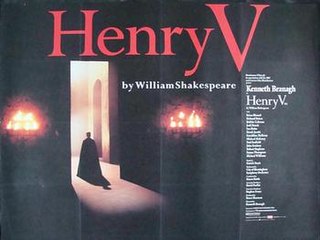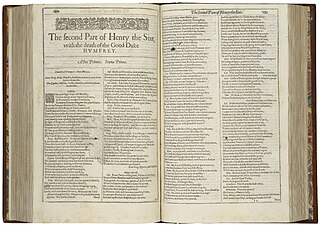
Sir John Falstaff is a fictional character who appears in three plays by William Shakespeare and is eulogised in a fourth. His significance as a fully developed character is primarily formed in the plays Henry IV, Part 1 and Part 2, where he is a companion to Prince Hal, the future King Henry V of England. Falstaff is also featured as the buffoonish suitor of two married women in The Merry Wives of Windsor. Though primarily a comic figure, he embodies a depth common to Shakespeare's major characters. A fat, vain, and boastful knight, he spends most of his time drinking at the Boar's Head Inn with petty criminals, living on stolen or borrowed money. Falstaff leads the apparently wayward Prince Hal into trouble, and is repudiated when Hal becomes king.

Henry V is a history play by William Shakespeare, believed to have been written near 1599. It tells the story of King Henry V of England, focusing on events immediately before and after the Battle of Agincourt (1415) during the Hundred Years' War. In the First Quarto text, it was titled The Cronicle History of Henry the fift, and The Life of Henry the Fifth in the First Folio text.

Henry V is a 1944 British Technicolor epic film adaptation of William Shakespeare's play of the same title. The on-screen title is The Chronicle History of King Henry the Fift with his battell fought at Agincourt in France. It stars Laurence Olivier, who also served as a director. The play was adapted for the screen by Olivier, Dallas Bower, and Alan Dent. The score was composed by William Walton.

Henry V is a 1989 British historical drama film written and directed by Kenneth Branagh in his feature directorial debut, based on William Shakespeare's history play of the same name. It stars Branagh in the title role of King Henry V of England, with Paul Scofield, Derek Jacobi, Ian Holm, Brian Blessed, Emma Thompson, Alec McCowen, Judi Dench, Robbie Coltrane, and Christian Bale in supporting roles.

Richard III is a play by William Shakespeare. It was probably written c. 1592–1594. It is labelled a history in the First Folio, and is usually considered one, but it is sometimes called a tragedy, as in the quarto edition. Richard III concludes Shakespeare's first tetralogy and depicts the Machiavellian rise to power and subsequent short reign of King Richard III of England.

The Raigne of King Edward the Third, commonly shortened to Edward III, is an Elizabethan play printed anonymously in 1596, and at least partly written by William Shakespeare. It began to be included in publications of the complete works of Shakespeare only in the late 1990s. Scholars who have supported this attribution include Jonathan Bate, Edward Capell, Eliot Slater, Eric Sams, Giorgio Melchiori and Brian Vickers. The play's co-author remains the subject of debate: suggestions have included Thomas Kyd, Christopher Marlowe, Michael Drayton, Thomas Nashe and George Peele.

Henry VI, Part 1, often referred to as 1 Henry VI, is a history play by William Shakespeare—possibly in collaboration with Thomas Nashe and others—believed to have been written in 1591. It is set during the lifetime of King Henry VI of England.

Henry VI, Part 2 is a history play by William Shakespeare believed to have been written in 1591 and set during the lifetime of King Henry VI of England. Whereas Henry VI, Part 1 deals primarily with the loss of England's French territories and the political machinations leading up to the Wars of the Roses, and Henry VI, Part 3 deals with the horrors of that conflict, 2 Henry VI focuses on the King's inability to quell the bickering of his nobles, the death of his trusted adviser Humphrey, Duke of Gloucester, the rise of the Duke of York and the inevitability of armed conflict. As such, the play culminates with the opening battle of the War, the First Battle of St Albans (1455).

Henry VI, Part 3 is a history play by William Shakespeare believed to have been written in 1591 and set during the lifetime of King Henry VI of England. Whereas 1 Henry VI deals with the loss of England's French territories and the political machinations leading up to the Wars of the Roses and 2 Henry VI focuses on the King's inability to quell the bickering of his nobles, and the inevitability of armed conflict, 3 Henry VI deals primarily with the horrors of that conflict, with the once stable nation thrown into chaos and barbarism as families break down and moral codes are subverted in the pursuit of revenge and power.

Sir Thomas Erpingham was an English soldier and administrator who loyally served three generations of the House of Lancaster, including Henry IV and Henry V, and whose military career spanned four decades. After the Lancastrian usurpation of the English throne in 1399, his career in their service was transformed as he rose to national prominence, and through his access to royal patronage he acquired great wealth and influence.
Sir Thomas Vaughan was a Welsh statesman and diplomat, who rose to prominence before and during the Wars of the Roses. He began as an adherent of Jasper Tudor and King Henry VI of England, and was appointed to several offices by Henry. He was nonetheless a Yorkist by inclination, as were many Welshmen of the time. After the Yorkist victory in 1461 he became a loyal and important servant of King Edward IV. In 1483, he was executed by Richard III as part of his seizure of the throne.

Fluellen is a fictional character in the play Henry V by William Shakespeare. Fluellen is a Welsh Captain, a leader of a contingent of troops in the small army of King Henry V of England while on campaign in France during the Hundred Years' War. He is a comic figure, whose characterisation draws on stereotypes of the Welsh at that time, but he is also portrayed as a loyal, brave and dedicated soldier.

The Famous Victories of Henry the fifth: Containing the Honourable Battel of Agin-court: As it was plaide by the Queenes Maiesties Players, is an anonymous Elizabethan play, which is generally thought to be a source for Shakespeare's Henriad. It was entered by printer Thomas Creede in the Stationers' Register in 1594, but the earliest known edition is from 1598. A second quarto was published in 1617.

The Wars of the Roses was a 1963 theatrical adaptation of William Shakespeare's first historical tetralogy, which deals with the conflict between the House of Lancaster and the House of York over the throne of England, a conflict known as the Wars of the Roses. The plays were adapted by John Barton, and directed by Barton and Peter Hall at the Royal Shakespeare Theatre. The production starred David Warner as Henry VI, Peggy Ashcroft as Margaret of Anjou, Donald Sinden as the Duke of York, Paul Hardwick as the Duke of Gloucester, Janet Suzman as Joan la Pucelle, Brewster Mason as the Earl of Warwick, Roy Dotrice as Edward IV, Susan Engel as Queen Elizabeth and Ian Holm as Richard III.
"Henry V" is fourth episode of the first series of the British television series The Hollow Crown, based on the play of the same name by William Shakespeare. The episode was produced by Rupert Ryle-Hodges, directed by Thea Sharrock and starred Tom Hiddleston as Henry V of England. It was first broadcast on 21 July 2012 on BBC Two.

An Age of Kings is a fifteen-part serial adaptation of the eight sequential history plays of William Shakespeare, produced and broadcast in Britain by the BBC in 1960. The United States broadcast of the series the following year was hosted by University of Southern California professor Frank Baxter, who provided an introduction for each episode specifically tailored for the American audience. At the time, the show was the most ambitious Shakespearean television adaptation ever made, and was a critical and commercial success in both the UK and the US. Performed live, all episodes were telerecorded during their original broadcast.













